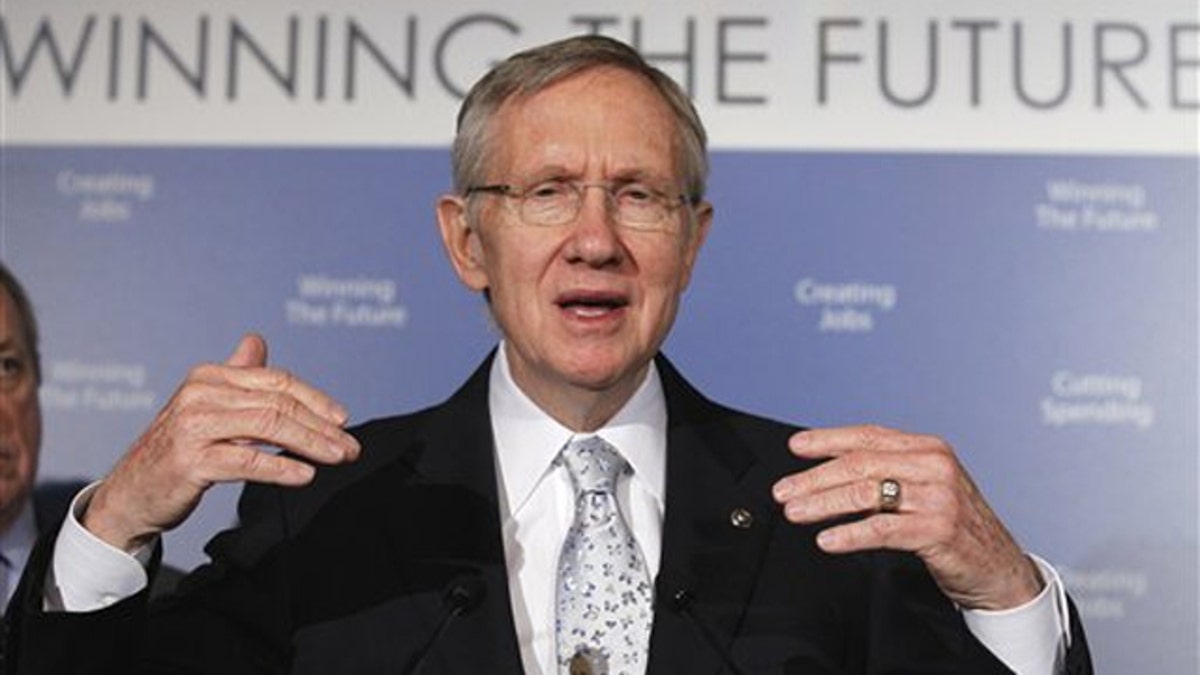
Senate Majority Leader Harry Reid gestures during a news conference on Capitol Hill Feb. 16. (AP)
WASHINGTON -- The Senate rejected two dueling budget bills Wednesday that were never expected to pass, clearing the way for further negotiations between Republicans and Democrats on how much to cut spending as Congress wraps up last year's unfinished budget work.
The Senate killed the House-passed GOP budget bill that would have slashed $61.5 billion in federal spending and the Democratic plan, backed by the White House, that would have cut agency operating budgets about $11 billion below last year's levels.
Both plans would have funded the federal government through the end of September.
But the GOP bill failed 44-56, falling 16 votes short of the 60 needed for passage. The Senate Democratic version failed 42-58 with 10 Democrats and one independent who aligns himself with Democrats voting against the bill.
Senate Democrats voted down the GOP plan over concerns that it cuts too deeply into programs like education, college aid, housing subsidies and a food program for low-income pregnant women and their babies.
Republicans and some Democratic moderates killed the Senate plan, saying the cuts were not enough when the deficit is projected to hit $1.6 trillion this year.
"It isn't often that two failed votes in the Senate could be called a breakthrough," Sen. Charles Schumer, D-N.Y., said Wednesday in a speech at the liberal Center for American Progress think tank. "Once it is plain that both parties' opening bids in this budget debate are non-starters, we can finally get serious about sitting down and narrowing the huge gap that exists between the two sides."
But some Republicans are vowing not to compromise.
"The president and his party leaders still don't get it," said Sen. Jeff Sessions, the top Republican on the Budget Committee. "If they think we can now proceed to some meager compromise, they are gravely mistaken. This Congress must deliver what the situation demands."
The combatants are facing a March 18 deadline that already has Republicans in the House drafting another stopgap spending measure to make sure the government doesn't shut down if a broader agreement isn't reached by then.
At issue are competing $1.2 trillion budget bills to fund the day-to-day operating budgets of every federal agency and provide a fresh $158 billion infusion for military operations in Iraq and Afghanistan. President Obama has been particularly generous to domestic agencies in the two years he's been in office, and Republicans controlling the House have promised to try to reduce such domestic "discretionary" spending back to levels in place in 2008.
The House GOP measure, Democrats say, would cram a year's worth of cuts into just six months, greatly disrupting the operations of the government and leading to furloughs of many thousands of federal employees. The possibility of furloughs of federal workers doesn't faze most Republicans.
Earlier Wednesday, Obama, facing backlash from members of his own party for not being more involved with contentious budget negotiations, met with Senate Democratic leaders at the White House.
White House chief spokesman Jay Carney said Obama was meeting with the Democratic leaders to discuss "obvious matters," but he disputed the notion that this was a sign that the president was becoming more actively involved in the negotiations.
"In this broader debate about spending, the president has been in discussion with leaders from both parties," he said.
The White House also issued a statement Wednesday clearly stating that the administration opposes the GOP plan and that the president will veto any bill "that undermines critical priorities or national security through funding levels or restrictions, contains earmarks, or curtails the drivers of long-term economic growth and job creation while continuing to burden future generations with deficits."
But that hasn't been enough to satisfy Democrats looking for help to break a bitter stalemate.
Freshman Democratic Sen. Joe Manchin, who will have to run for re-election in 2012, accused Obama of sitting on the sidelines.
"Our president has failed to lead this debate or offer a serious proposal for spending and cuts that he would be willing to fight for," Manchin, of West Virginia, said on the Senate floor Tuesday.
Carney said Obama's meeting with Senate Democrats was not scheduled in response to Manchin's comments.
The White House doesn't plan meetings "based on comments from individual senators," Carney said.
The Associated Press contributed to this report.












































